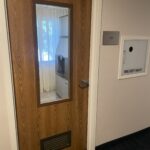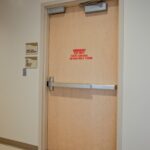A couple of weeks ago when I was on vacation staying in an Airbnb, a reader of iDigHardware coincidentally asked me about the codes that apply to Airbnb rentals and other similar short-term rental sites. This is an interesting question, and not easy to answer definitively. In case you aren’t familiar with Airbnb, the company offers an alternative to hotels; individuals can post their home or a portion of their home for visitors to rent short-term.
As with some small guest houses and bed & breakfasts, fire protection, egress, and accessibility of door openings in Airbnbs do not always meet the expectations of guests who notice such things (us). Here are a couple of examples from past posts:
So let’s say that I’m thinking about renting out my college-bound daughter’s bedroom on Airbnb to help offset the cost of her books and fees (I’m not, but hypothetically speaking). Does her bedroom door need to be a fire door? Is my house now a small hotel?
AirBNB’s website refers to the International Building Code (IBC) on their page about responsible hosting in the US:
“Ensure you have a functioning smoke alarm and carbon monoxide detector, and that your property meets government safety guidelines for your area (e.g., International Building Code). Ensure you provide a functioning fire extinguisher and complete required maintenance.”
But a single-family home in the US is required to comply with the International Residential Code (IRC), not the IBC – right? The scope of the IRC covers one- and two-family dwellings and townhouses not more than 3 stories above grade with a separate means of egress. My house is a single-family home, 3 stories, and the means of egress for the house is not connected to the means of egress for another residence.
BUT – the IRC states that certain other uses can be constructed in accordance with the IRC “where provided with a residential fire sprinkler system complying with Section P2904.” Those facilities are:
- Live/work units located in townhouses and complying with the requirements of Section 419 of the International Building Code.
- Owner-occupied lodging houses with five or fewer guestrooms.
- A care facility with five or fewer persons receiving custodial care within a dwelling unit.
- A care facility with five or fewer persons receiving medical care within a dwelling unit.
- A care facility for five or fewer persons receiving care that are within a single-family dwelling.
Is my home now considered an owner-occupied lodging house? Do I need a residential sprinkler system?
The IRC Commentary says: Exception 2 allows small bed and breakfasts to be constructed according to the code. A definition of “Lodging house” is included in Chapter 2 to generally encompass rental lodging within dwelling units, distinct from hotels and boarding houses that are “not occupied as a single-family unit.”
The IRC defines a lodging house as: A one-family dwelling where one or more occupants are primarily permanent in nature, and rent is paid for guestrooms.
Well, I’m a primarily permanent occupant, and if I was renting my daughter’s bedroom on Airbnb, then rent would be paid by guests. But I don’t have a residential sprinkler system, and my town doesn’t require sprinkler systems for existing homes. [Note: Some jurisdictions have modified their codes to remove the requirements for residential sprinkler systems in new homes – that’s a whole other can of worms.]
I have checked with several code officials, and the answer to this question comes down to local mandates and enforcement. The IRC is used during construction, and not typically used for inspection of existing homes (same with the IBC). If the International Fire Code (IFC) is being enforced, my hypothetical rental might be considered an R-3 occupancy: “where the occupants are primarily permanent in nature and not classified as Group R-1, R-2, R-4 or I, including lodging houses with five or fewer guest rooms.”
Will the fire department show up to inspect my home and verify that it meets the requirements of the IFC? That really depends on the local jurisdiction. Given the confusion about this occupancy type, it’s best for states or cities/towns to enact local laws or policies that address all aspects of short-term rentals – taxes, zoning, licensing, codes, etc. New York City and San Francisco have such ordinances in place. For specific information regarding your location, I would recommend contacting your local AHJ.
Personally, I’m reserving my daughter’s bedroom for non-paying guests. 😀
You need to login or register to bookmark/favorite this content.





The person to ask is your insurance agent.